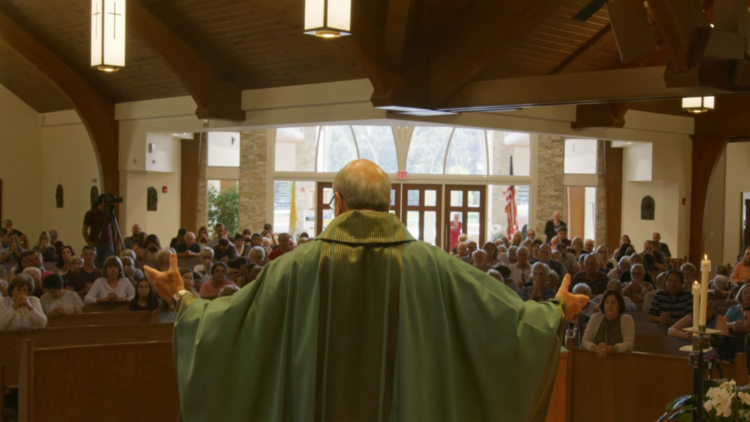An insightful reflection by Bill Cain, S.J., for America on presiding and celebrating the liturgy over 50 years ends with the simple line: “Miracles abound.”
Indeed, that has been my experience. One of my goals as a priest and media professional is to bring to a broader public an appreciation for the intentionality that comes with celebrating Mass and witnessing to the Gospel week to week. Hence, the title of our video collaboration with America, “Sunday to Sunday.”
This year, our preaching journey considers four priests whose diverse ministries are an inspiration. Getting to know their communities of faith, living with each priest for several days, while carefully documenting their efforts is a grace for my video crew and me. And yes, miracles abound!
Season 2 of this video series considers four priests in diverse ministries.
“Sunday to Sunday” rests on the excellence of preachers. This is the all-important insight that drives each episode. Ricky Manalo, C.S.P., is a first-rate musician and an expert on Asian-Pacific Catholics; the Rev. Bob Stagg is the pastor of a large “destination church” in Bergen County, N.J.; the Rev. Chris Walsh ministers to a dynamic and highly engaged African-American community in Philadelphia; and the Rev. Manuel De Jesus Rodrigues is on the front lines of ministry to the diverse community of Queen’s Astoria neighborhood in New York City.
These are priests consumed by their day-to-day efforts. Our cameras do not come close to capturing their apostolic zeal.
Above all, our series is dedicated to best practices in preaching. It seeks to be a teaching tool, to assist teachers of homiletics in inspiring a new generation of preachers among priests, deacons, lay women and youth ministers.
As a documentary video series, “Sunday to Sunday” draws on the cinematic techniques found in films like “Of God and Men” and “Into Great Silence.” The goal here is to convey the intimacy of an authentic faith community. Frankly, most video productions of liturgies suffer from a lack of close-up shots.
These are priests consumed by their day-to-day efforts. Our cameras do not come close to capturing their apostolic zeal.
Take, for example, the rise of live-streamed Masses because of the closing of church buildings due to health concerns related to Covid-19. Such efforts are worth careful attention. With teams of young creatives around the country, a whole new media ministry is emerging. Churches like Saint Monica in Santa Monica, Calif., and Nativity in San Luis Obispo, Calif., celebrated Holy Week with an extraordinary interplay of music, liturgy and thoughtful preaching.
Such examples help us to consider new ways of ministering to parishioners, in which preaching requires careful preparation and clarity of expression.
A final thought: A decade or so ago, I discovered an interview with the famed media theorist Marshall McLuhan. His dialogue with Pierre Babin occurred in 1977 when issues about the introduction of vernacular languages into the Roman Catholic liturgy were still being hotly debated.
McLuhan took an original position. He did not think Latin Mass was the victim of Vatican II. Instead, he insisted that the microphone, as a practical tool of communication, made the “indistinct mumble” of the priest presiding in Latin unacceptable for the congregation.
McLuhan foresaw that new media would spark an intimate or “participatory culture” that would have concrete effects on Sunday Mass, whereby the newly revised vernacular liturgy would “work better in the small community.”
In the words of St. Paul: “Don’t stifle the Spirit!” Let our most recent experiences of closed churches open us to considering the quality of our religious and liturgical expression in the preached word and how best to utilize these tools in an age of new media.
To this end, the connection is Christ, who is present in the preached word.









